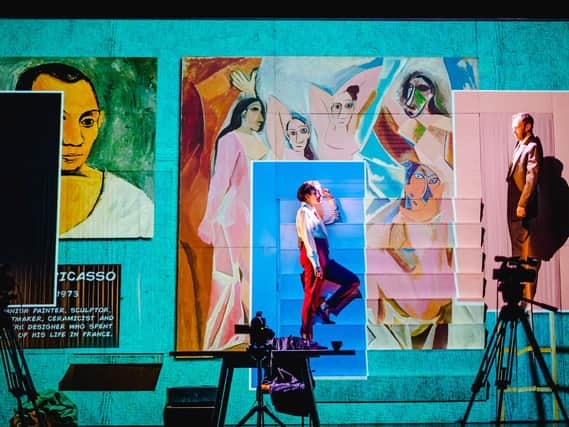Yorkshire theatre company Imitating the Dog on return to Leeds Playhouse with Dracula


The Covid pandemic has heralded the arrival of a new way of thinking about work in so many ways, perhaps no more so than in the world of theatre.
With digital productions and livestreams, theatre has seen its march towards digital turbo-charged by the restrictions of lockdown.
Advertisement
Hide AdAdvertisement
Hide AdFor over two decades the Yorkshire-based company has taken its work around the world where it has been seen in theatres, obviously, but perhaps just as importantly also at festivals and outdoor events – something that has informed the fact that it is as ready for any theatre company for the coming digital tsunami.
As the company’s website says: “We create beautiful, memorable images for audiences and the work fuses live performance with digital technology, in order to serve the story in the best possible way.” Imitating the Dog has been preparing for the digital-live-fusion environment for some time already.
Since 1998 the company has been making work in this way with co-artistic directors Pete Brook, Andrew Quick and Simon Wainwright.
Back in January 2020, the company just sneaked in ahead of lockdown with its impressive retelling of the zombie classic Night of the Living Dead. While the company has always looked to retell classic stories in new ways, the method on show with this production, co-produced with Leeds Playhouse, turned a lot of heads.
Advertisement
Hide AdAdvertisement
Hide AdThe stage was a busy, head- spinning affair, with the original George A Romero movie playing on one half of the stage while it was recreated, shot-for-shot, by actors on the stage, with the action they were playing out then live broadcast on a screen on another half of the stage.
If it sounds confusing in the description, in reality it made perfect sense.
The company are back at it, albeit in a post-pandemic world, taking another classic story and reimagining it for a new generation.
The story this time sees Imitating the Dog revisiting the world of the undead, but a more classic interpretation of that phrase – this time it’s Dracula.
Advertisement
Hide AdAdvertisement
Hide AdOr rather, an adaptation of a graphic novel based on the Bram Stoker creation.
“The original novel haunts our story, but we’re really interested in Mina Harker,” says Andrew Quick. “In the original novel she’s the figure that puts all the elements of the story together and if you dig deep into the novel, you work out she’s the real detective figure in that narrative.”
Their version of the story begins in 1965 when a woman claims to be Mina Harker and confesses to a brutal murder that evening and while Mina Harker would be in her 80s, the confessor is in her 20s.
“In the graphic novel’s world Dracula is not a work of fiction, but an historical figure. Mina Harker tells her story and we find out what she did to Dracula in 1895 and what he did to her and how that has haunted her in the intervening years.
Advertisement
Hide AdAdvertisement
Hide Ad“Graphic novels have always influenced our work – I suppose it’s the link between literature, art and cinema that attracts us. We’ve always been drawn to pulp narratives, detective and sci-fi fictions, which all suit the graphic novel genre.
“In this show we have a large projection screen, a wall, onto which the actors’ image is thrown using the digital technology we have available.
“We use live camera feeds and face-recognition techniques and the screen operates just like the pages of a graphic novel; we even turn the pages for the audience and we mix up spoken text with graphical representations of the text. I suppose this is the theatricality of the piece – you get a stage picture and action, which in some ways is very different to the screen action.
“You see the piece being stitched together in front of you. I don’t think we worry about being original – for us it’s always the search for the best way to tell the story, that’s what it always is for us – solving the problem of how to tell the story. It’s the challenge of all theatre.
Advertisement
Hide AdAdvertisement
Hide Ad“It’s new for us, but feels like a natural development from our previous work. I think it will be exciting for audiences and this theatre suits the limitations Covid has forced on us.”
So the company is up to its old tricks again, blending live action with digital technology – the kind of work it was already making and which has undoubtedly helped it return post-lockdown.
It hasn’t, however, meant the company has escaped the slings and arrows of the pandemic.
“It’s been very challenging. We’re making the show at Leeds Playhouse as co-producers and it’s been wonderful to work in the theatre for four weeks but, like everywhere else in the UK we’ve been hit by Covid,” says Quick.
Advertisement
Hide AdAdvertisement
Hide Ad“Rehearsals have been affected by Track and Trace – there’s been much pinging, plus we have been adhering to the two-metre rule, which sort of suits our graphic novel staging, but it’s limited the kinds of creative choices we can make on the stage.”
As ever, the inventive theatre company has been inventive about dealing with the vagaries of the pandemic, but clearly it’s wearing.
“We’re doing new things. I haven’t seen much like this before – although there are probably others in the world making work like this.”
Comment Guidelines
National World encourages reader discussion on our stories. User feedback, insights and back-and-forth exchanges add a rich layer of context to reporting. Please review our Community Guidelines before commenting.
